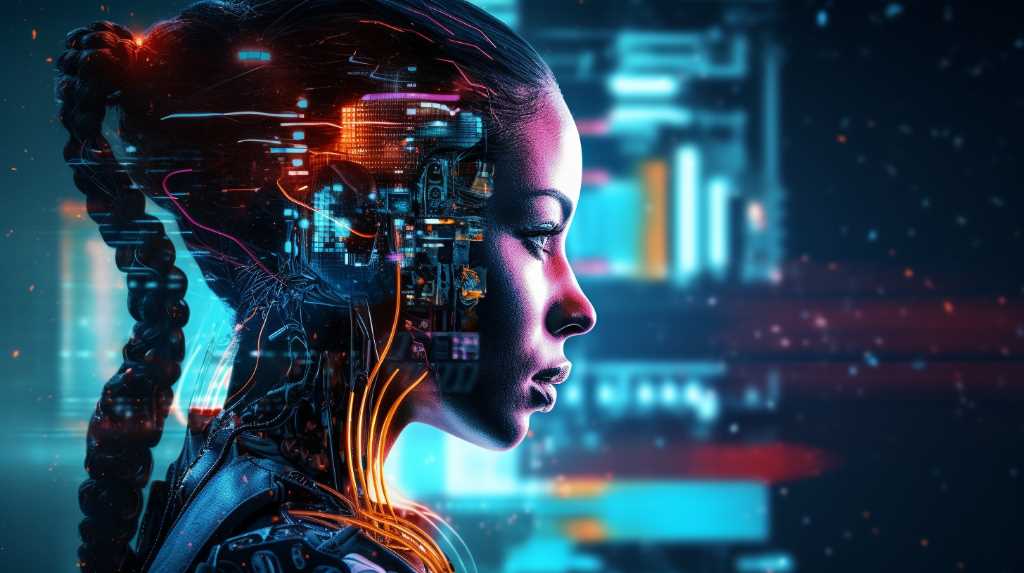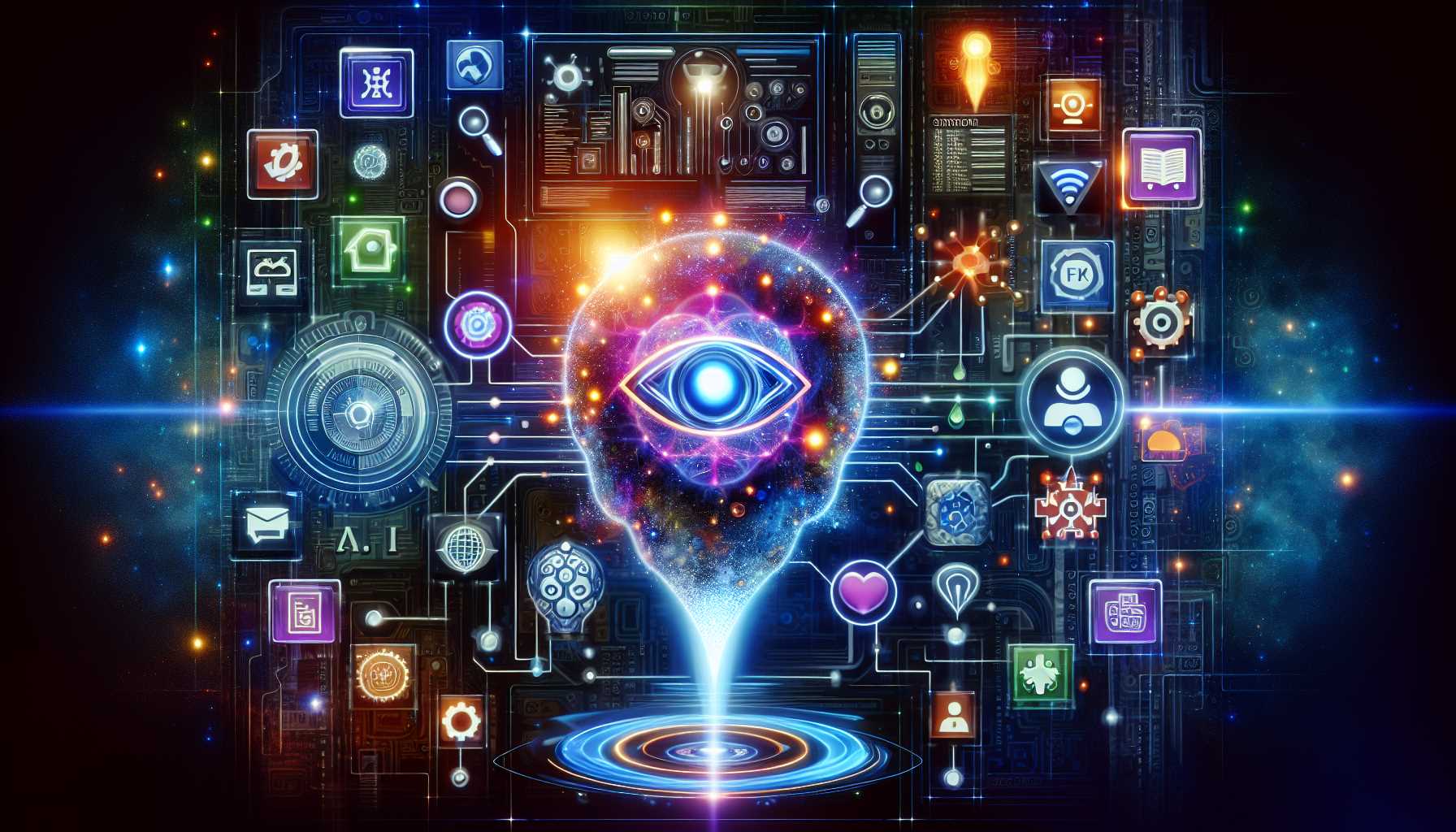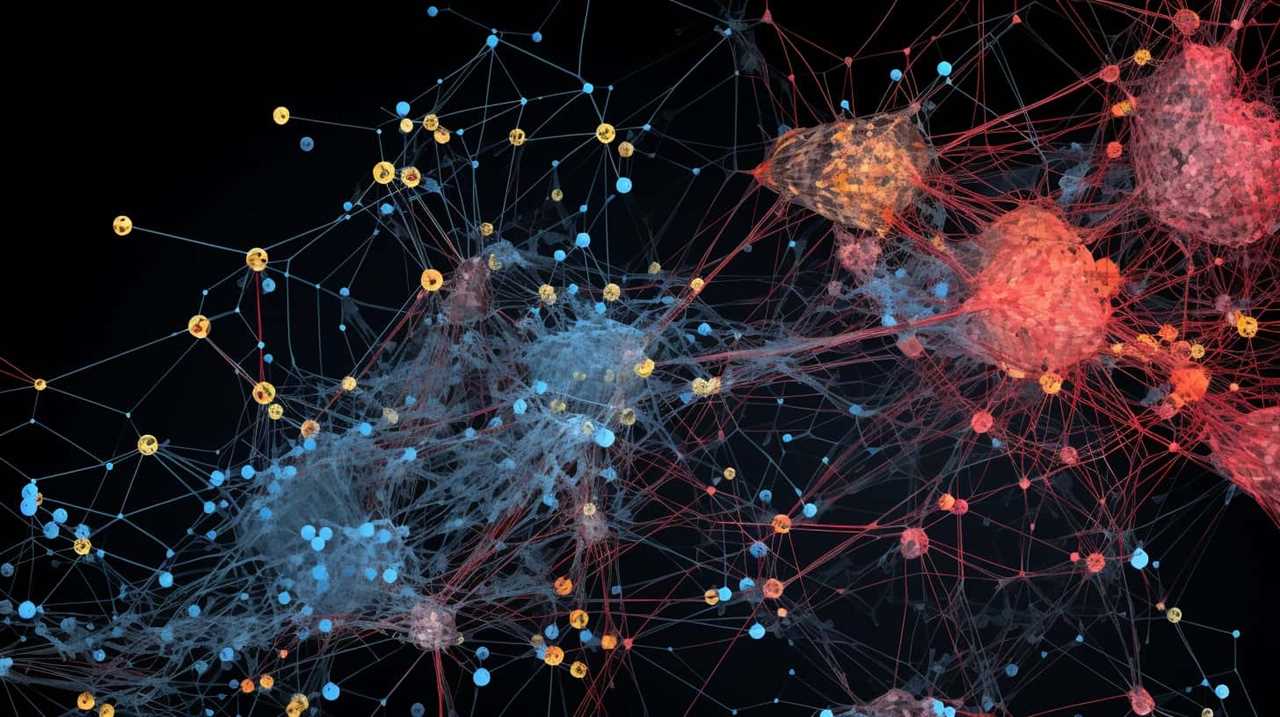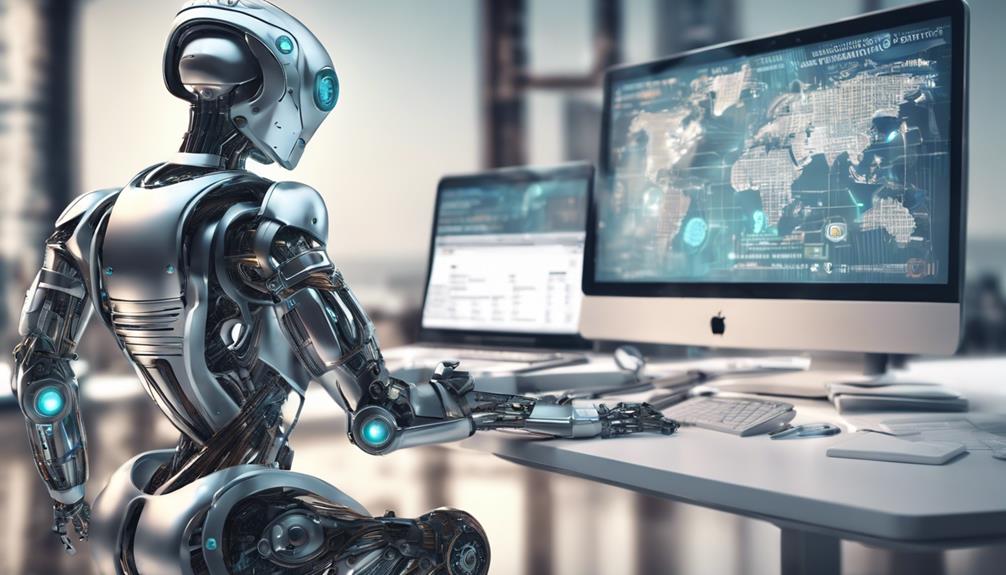As global citizens, we have witnessed the rapid integration of artificial intelligence (AI) into our societal framework.
At the recent Global AI Safety Summit, the United States and China emerged as leaders in addressing the challenges and opportunities associated with AI.
In the US, companies have made voluntary commitments and the Department of Commerce has launched an AI safety institute.
China emphasizes equal rights for every country to develop AI, promoting global cooperation.

Together, these nations are shaping the future of AI with responsible development and global cooperation.
Key Takeaways
- The United States is focusing on companies making voluntary commitments and adhering to reporting requirements, as well as launching an AI safety institute under the Department of Commerce.
- China is prioritizing equal rights for every country to develop and use AI, as well as promoting global cooperation to share AI knowledge on open-source terms.
- Responsibility and accountability are key concerns discussed in the roundtable discussions, with developers having the responsibility to avoid sharing harmful models and vendors bearing the burden of safety.
- The integration of AI in society raises issues such as global inequality in access and representation, privacy and IP rights of AI creators, and the need for better technical evaluations reflecting societal impact.
US Commitments and AI Safety Institute
We frequently emphasize our commitment to AI safety by launching an AI safety institute under the Department of Commerce. This initiative showcases our dedication to ensuring the safe development and deployment of artificial intelligence technologies. By establishing this institute, we aim to address the potential risks and challenges associated with AI advancements.
Our objective is to develop robust safety protocols and guidelines that can be implemented across various industries. Through research, collaboration, and knowledge sharing, we strive to foster a culture of responsible AI development.
This institute will serve as a hub for experts and stakeholders to come together, exchange ideas, and collectively work towards creating a safer AI ecosystem. We believe that proactive measures, such as the establishment of an AI safety institute, are crucial in order to harness the full potential of AI while safeguarding against potential risks.

China’s Equal Rights for AI Development
How does China ensure equal rights for every country to develop and use AI?
China focuses on promoting global cooperation and sharing AI knowledge on open-source terms. By doing so, China aims to create an environment where every country has an equal opportunity to participate in AI development.
This approach allows for the exchange of ideas, advancements, and resources, fostering a collaborative and inclusive AI ecosystem. China recognizes the importance of providing equal access to AI technologies to bridge the global inequality gap.
Through its commitment to open-source terms, China aims to ensure that AI development isn’t limited to a few privileged nations, but rather becomes a shared endeavor that benefits all countries, regardless of their level of development.

Global Cooperation in Sharing AI Knowledge
China’s commitment to promoting equal rights for every country to develop and use AI extends to its active participation in global cooperation, fostering the sharing of AI knowledge on open-source terms.
This collaboration is crucial in advancing the field of AI and ensuring that its benefits are accessible to all nations. By sharing AI knowledge on open-source terms, countries can contribute their expertise and insights, allowing for the collective growth and improvement of AI technologies.
This global cooperation also promotes transparency and accountability, as it encourages the sharing of best practices and the identification of potential risks and challenges associated with AI development and deployment.
Eu’s Focus on Innovation, Guardrails, and Governance
Continuing the discussion from the previous subtopic on global cooperation, the EU focuses on promoting innovation, establishing guardrails, and implementing effective governance in the field of AI.

In terms of innovation, the EU is opening up its supercomputers for free training of models, specifically for EU startups. This move aims to foster the development of AI technologies and applications within the EU.
Additionally, the EU is finalizing the AI act, which includes regulations and guidelines for the use of AI systems. The act aims to establish guardrails and ensure the responsible and ethical deployment of AI technologies.
Moreover, the EU is actively involved in governance initiatives, such as the G7 voluntary code for AI regulations. These efforts demonstrate the EU’s commitment to shaping the development and deployment of AI in a manner that aligns with its values and priorities.
India’s Perspective on AI as a Digital Enabler
In the discussion on global cooperation and perspectives on AI, we now shift our focus to India’s perspective on AI as a digital enabler.

India recognizes the potential of AI to drive mass digital adoption and economic growth. The government believes that AI can play a crucial role in addressing societal challenges and improving governance. However, India also acknowledges the need for responsible and ethical AI development. It emphasizes that regulation shouldn’t fall behind innovation while ensuring the safety and security of AI systems.
India aims to leverage AI to enhance the delivery of public services, improve healthcare, and foster innovation in various sectors. The country is actively investing in AI research and development, fostering collaborations with academia, industry, and international partners to harness the full potential of AI as a digital enabler.
Uae’s Development of Multilingual AI
Shifting our focus to the development of multilingual AI, we recognize the efforts made by the UAE in leveraging artificial intelligence to bridge language barriers and enhance communication.
The UAE has been at the forefront of developing AI systems that can understand and translate multiple languages accurately. By investing in research and development, the UAE aims to create AI models that can handle the complexities of different languages, dialects, and cultural nuances.

This development is crucial for a country like the UAE, which is known for its diverse population and international business environment. With multilingual AI, the UAE can facilitate seamless communication between individuals and organizations from different linguistic backgrounds, fostering greater collaboration and understanding.
This initiative demonstrates the UAE’s commitment to harnessing AI’s potential for societal benefit and promoting inclusivity in the digital age.
Nigeria’s Approach to Ai’s Socio-Economic Impact
We can now delve into how Nigeria approaches the socio-economic impact of AI, recognizing its potential as a beneficial force in education and healthcare.
Nigeria has identified the importance of addressing the challenges and opportunities that AI presents. The country acknowledges that AI has the capacity to transform various sectors, including education and healthcare, by enhancing access, improving efficiency, and promoting innovation.

Nigeria is working towards creating an ecosystem that fosters AI development and adoption, while also considering the potential social and economic implications. The government is investing in AI research and development, promoting AI education and skills training, and encouraging the use of AI in healthcare delivery and education systems.
Korea’s Principles for Aligned AI Development
As we explore the topic of Korea’s Principles for Aligned AI Development, it’s important to consider the guiding principles that shape their approach to AI.
Korea’s principles include Freedom, Fairness, Safety, Innovation, and Solidarity. These principles highlight their focus on protecting the privacy of citizens and ensuring equal opportunities for all.
Korea recognizes the importance of balancing innovation and safety, acknowledging that AI should be developed responsibly and ethically. They also emphasize the need for international collaboration, allowing countries to have their own perspectives while working towards shared goals.

In addition, Korea places importance on the inclusion of young citizens in AI committees and the evaluation of AI’s societal impact.
Roundtable Discussions on Responsibility, Control, Pausing AI, Risks, and Integration
The roundtable discussions on responsibility, control, pausing AI, risks, and integration delved into the key considerations surrounding the development and implementation of AI technologies.
Participants emphasized the importance of responsibility and accountability in AI development. Developers were seen as having the responsibility to avoid sharing harmful models, while vendors were expected to bear the burden of safety.
The topic of loss of control was also addressed, with the understanding that current AI systems require human prompting and have limited real-world actions. It was noted that humans are more likely to give control than systems taking it.

Regarding pausing AI development, responsible developers were encouraged to exercise caution, although it was acknowledged that those who don’t care may not stop.
The discussions also highlighted the risks associated with open source, including the potential for unpredictable failures and the empowerment of bad actors. However, open source was also seen as a means to promote inclusive AI.
Integrating AI into society was another focal point, with attention given to global inequality in access and representation by AI models, privacy and IP rights, technical evaluations reflecting societal impact, and the inclusion of young citizens in AI committees.
International collaboration was deemed crucial, with the emphasis on starting with shared values and allowing countries to have their own perspectives.

The discussions also called for the publication of an open list of research questions for quick prioritization and the building of capacity alongside shared resources. The article highlighted the need for growing global technical expertise and continuous AI testing and auditing as action items.
Regulation examples, such as product safety laws, liability laws, and sandboxing AI, were also mentioned.
Frequently Asked Questions
What Are Some Examples of Companies in the United States That Have Made Voluntary Commitments in AI Safety?
Some companies in the United States have made voluntary commitments in AI safety. They are taking responsibility and adhering to reporting requirements to ensure the development and use of AI is safe and accountable.
How Will the AI Safety Institute Under the Department of Commerce in the United States Contribute to Ensuring AI Safety?
The AI safety institute under the Department of Commerce in the United States will contribute to ensuring AI safety by promoting voluntary commitments from companies and enforcing reporting requirements for transparency and accountability.

What Are Some Specific Initiatives That China Has Taken to Promote Equal Rights for Every Country to Develop and Use Ai?
China promotes equal rights for every country to develop and use AI through global cooperation and sharing AI knowledge on open-source terms. This initiative aims to foster collaboration and ensure inclusivity in the development and utilization of AI technologies worldwide.
How Does Global Cooperation in Sharing AI Knowledge on Open-Source Terms Benefit the Development and Advancement of AI?
Global cooperation in sharing AI knowledge on open-source terms benefits the development and advancement of AI by promoting collaboration, accelerating innovation, and ensuring that AI technologies are accessible to all countries, fostering a more inclusive and equitable AI ecosystem.
What Are Some Key Focus Areas of the EU in Regards to AI, Including Innovation, GuardrAIls, and Governance?
The EU’s key focus areas in AI include innovation, guardrails, and governance. They aim to open up supercomputers for free training, finalize AI regulations, and establish a voluntary code for AI.
Conclusion
In the symphony of global AI development, the United States and China have harmoniously taken the lead, conducting the way towards responsible and ethical AI practices. With their voluntary commitments, the US has set the stage for responsible development, while China embraces inclusivity and global cooperation.

Together, they form a powerful duet, working towards a future where AI benefits humanity. As the world continues to navigate the complexities of AI, these frontrunners serve as beacons of innovation, guiding us towards a brighter and more equitable tomorrow.









